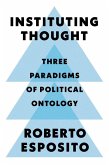After two years of global pandemic, it is no surprise that immunization is now at the center of our experience. From the medicalization of politics to the disciplining of individuals, from lockdowns to mass vaccination programs, contemporary societies seem to be firmly embedded in a syndrome of immunity. To understand the ambivalent effects of this development, it is necessary to go back to its modern genesis, when the languages of law, politics, and medicine began to merge into the biopolitical regime we have been living under for some time. This regime places a high priority on immunization and security: no security is more important than health security. The Covid-19 pandemic has taken the dynamic of immunization to a new level: for the first time in history, we see societies seeking to achieve generalized immunity in their entire populations through vaccination. This allows us to glimpse the possibility of a "common immunity" that strengthens the relation between community and immunity. The dramatic tensions we have experienced in recent years between security and freedom, norm and exception, power and existence, all refer to the complex relationship between community and immunity, the decisive features of which are reconstructed in this book. Building on the prescient argument originally developed two decades ago in Immunitas, Roberto Esposito demonstrates in this new book how the pandemic and our responses to it have brought into sharp relief the fundamental biopolitical conditions of our contemporary societies.
Dieser Download kann aus rechtlichen Gründen nur mit Rechnungsadresse in D ausgeliefert werden.
"Common Immunity interrogates the democratic potential of a politics of universal social immunity able to overcome the terminal limitations, contradictions, and impasses of contemporary liberal governmentality. This book is an urgent, forceful, and enlightening reformulation of biopolitical theory and its practical potential."
Alberto Moreiras, Texas A&M University
Alberto Moreiras, Texas A&M University









